
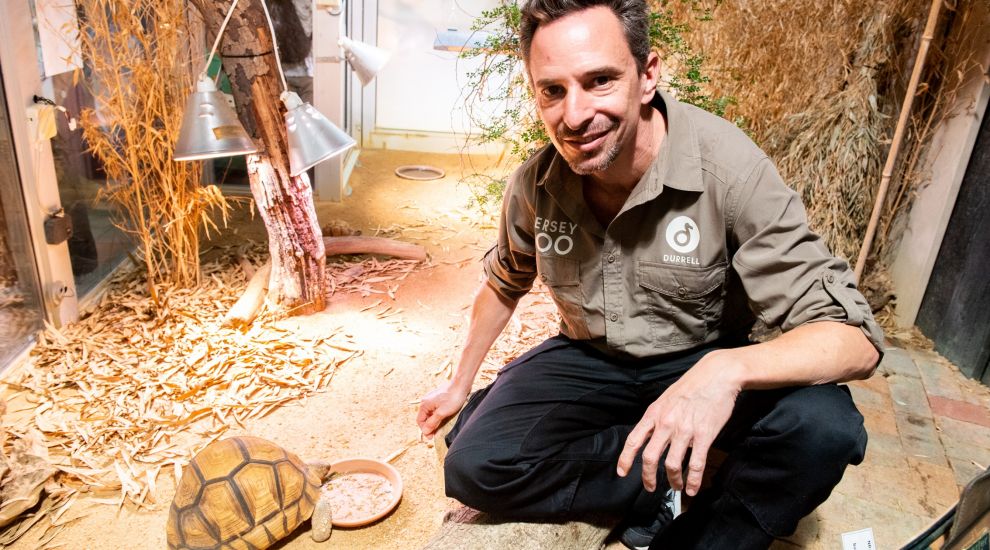

From his childhood fascination with reptiles and amphibians – preferably ones which other people were unable to identify – to his flirtation with the idea of becoming a journalist in China, Durrell’s curator of herpetology and invertebrates is definitely the sort of person who prefers to eschew trends and forge his own path.
“My love of nature stems from my very early childhood,” explained Matt Goetz, as he recalls playing in the forests of his native Germany and tracking animal prints in the snow with his father.
“I was out and about all thee time, and my dad encouraged that interest in flora and fauna, teaching me how to identify animals from their tracks in the winter and introducing me to different flowers and plants in the summer.
“While my parents definitely fostered my love of nature and animals, I was always drawn to those animals which it was less conventional to like. As most people like mammals and birds, I decided to like something else and I went for reptiles and amphibians.”

Pictured: Durrell’s curator of herpetology and invertebrates, Matt Goetz.
Rather than indulging a rebellious streak with this choice, though, Matt’s fascination with these species stemmed from a love of research and learning, which remains with him to this day.
“I was always most interested by things which weren’t very well known so that there was lots to discover," he smiled. "While I started with breeding tadpoles in spring and then moved on to geckos in my teenage years, I was always drawn to those animals which no one knew anything about.
“Germany was somewhat ahead of the UK in that there were quite a few private reptile and amphibian keepers in the 80s and 90s but they tended to go for “mainstream” pets such as corn snakes and royal pythons. On the other hand, I would go to acquaintances or pet shops and look for those animals which I didn’t know.
"In some cases, even the shop owner couldn’t tell me what the species was. Researching those animals, and learning how to look after and breed them, really developed my interest and expertise in conservation and animal husbandry.”
Despite this burgeoning interest, when Matt enrolled at the University of Tübingen, it was to study Chinese, politics and journalism rather than anything animal-related.
“I really wanted to read biology but I didn’t think that I was strong enough in the other sciences to study that subject so, again wanting to do something different, I decided to become a journalist in China and undertake a degree related to that,” he explained.
Two years into his course, though, Matt’s life changed direction when health issues forced him to abandon his studies.
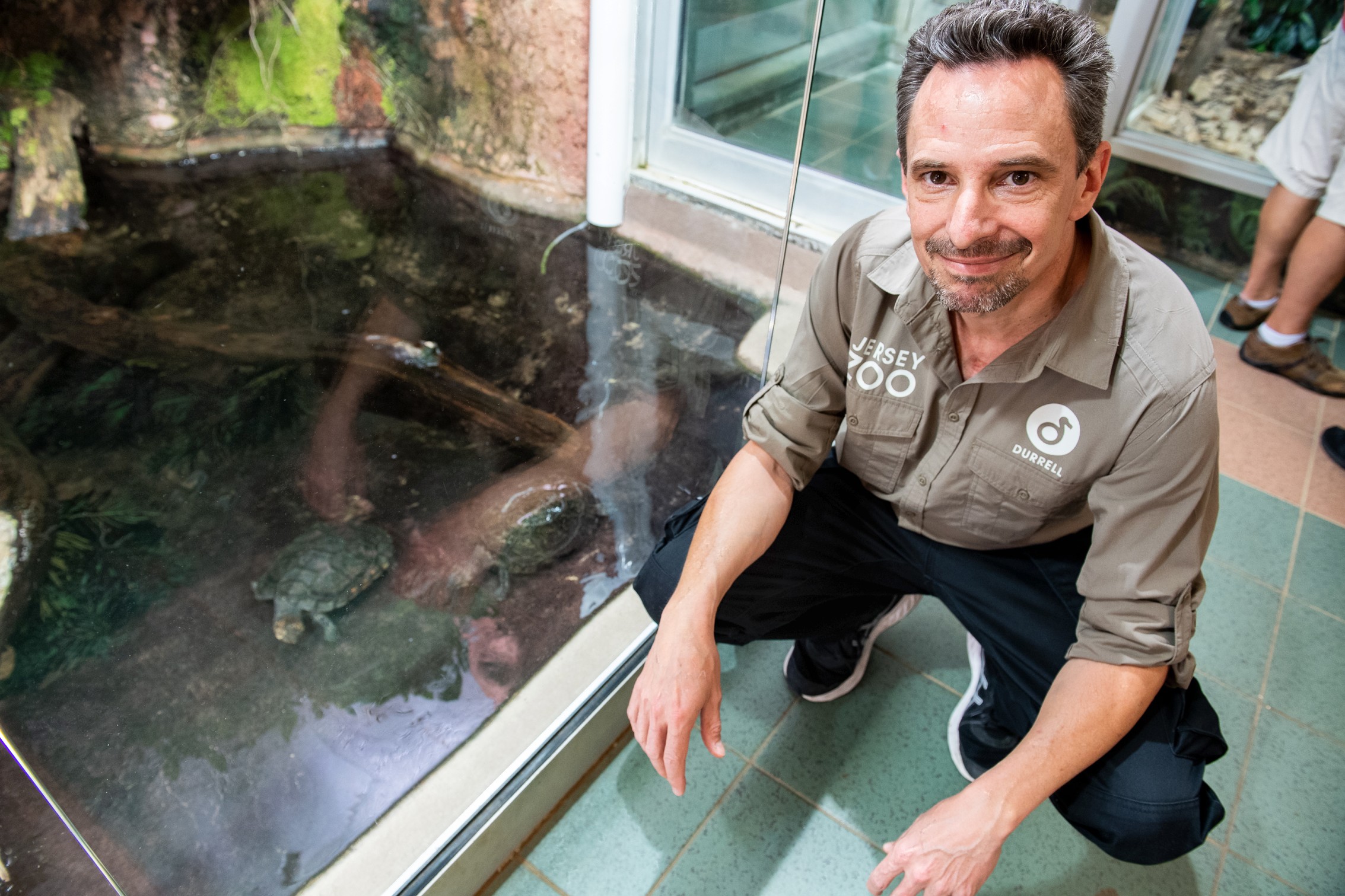
Pictured: "I was always drawn to those animals which no one knew anything about".
“I underwent major surgery and, while recuperating from that, I had a year away from learning environments. That break gave me the push and the confidence to say, ‘let’s do what I always wanted to do’, which meant that, when I returned to university, it was to study biology.”
Studying and “topping up his funds” by becoming a research and teaching assistant, Matt fell on his feet.
“It was the perfect combination of studying, carrying out research, teaching and looking after animals in the university’s small-animal department,” he said. “In fact, I enjoyed it so much that I was planning to go abroad and complete my doctorate so that I could remain in the academic world.”
It was while looking for suitable openings that Matt, scanning an edition of Zoo News Digest, stumbled across an advert for a supervisor in Durrell Wildlife Conservation Trust’s herpetology department.
“It was the first job that I had considered applying for and it was daunting because I knew that I would have to apply in English and they were looking for someone with zoo experience, which I didn’t have,” he recalled.
“Despite being almost certain that I wouldn’t get the position, its combination of research, teaching, captive breeding and field programmes encapsulated everything that I liked, so I decided to go for it and, for some reason, they offered me the job.”
That was in 2002 and, since then, Matt has progressed from supervisor to deputy head to curator, with the role expanding this year to include invertebrates as well as reptiles and amphibians.
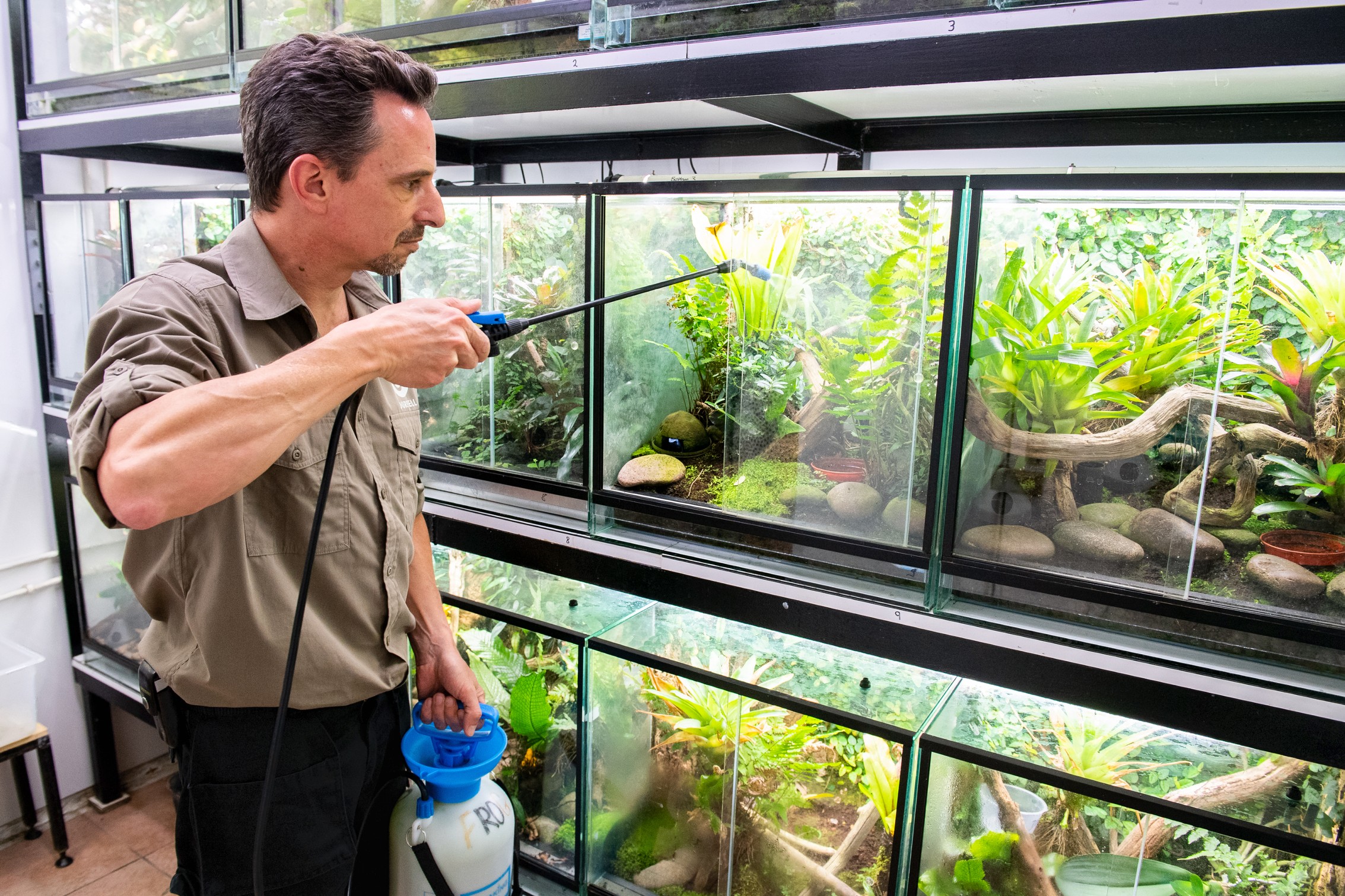
Pictured: Matt has worked at Durrell since 2002.
And it is not just the range of species under his care which has contributed to his diverse 21-year career.
“The amount of time I’ve spent here shows just how much I love the job and is testament to the fact that it is never boring,” he chuckled.
“Everything I do from looking after my staff to making sure that the animals are cared for to the highest standards is not only interesting and varied but also contributes to our conservation work in the field.”
With Durrell committed to restoring habitats and releasing species back into the wild, field work is central to the organisation’s mission, and Matt reflects on two particular overseas projects which have absorbed much of his time over the years.
“One of our longest-standing programmes involves the ploughshare tortoise, which is one of the rarest tortoises in the world, found only in a small area of Madagascar,” he explained.
Prized because of their rarity, these tortoises are critically endangered, and their plight became even more serious after an incident in 2015 which “devastated” Matt and his team.
“In the wild, the ploughshare tortoise is found only in Baly Bay in Madagascar where, in conjunction with the Madagascan government, we have created a national park and breeding centre,” he said. “For many decades, we had been breeding this species and releasing animals back into the wild to boost the population.
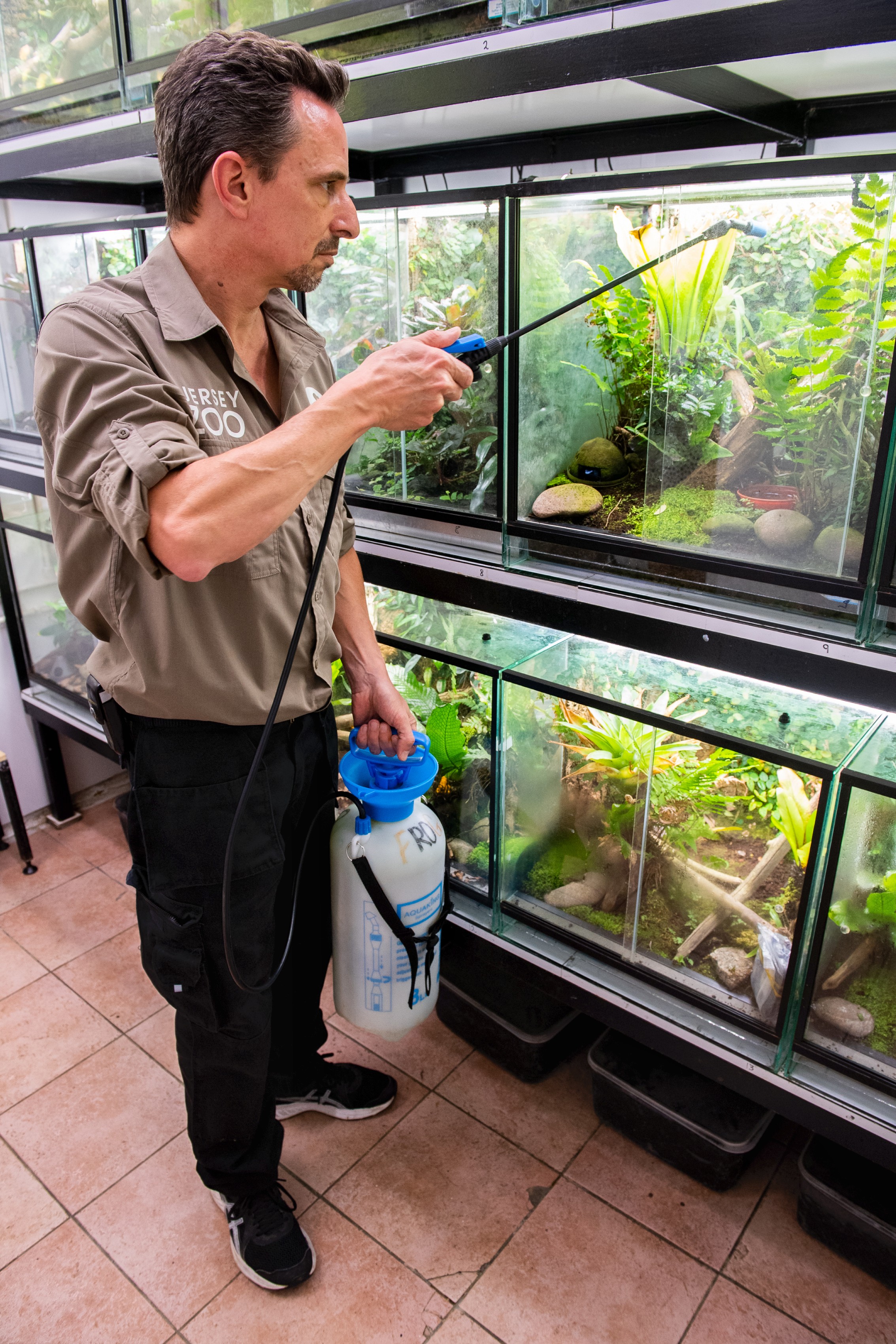
Pictured: Matt reflects on two particular overseas projects which have absorbed much of his time over the years.
“However, in 2015, we lost hundreds of tortoises, as they were smuggled out of the island to cater for demand from wealthy Chinese and south-east Asian residents.
“While the loss was devastating and it is easy to criticise those involved in the smuggling, it is also important to remember the extreme poverty in which many of the Madagascan people live. A lot of them are surviving on less than a dollar a day and, suddenly, they had the opportunity to earn 300 or 400 dollars per tortoise.”
While it would have been easy for the Durrell team to admit defeat, Matt explains that walking away from this "important conservation project" was not an option.
“Our work with the ploughshare tortoise is not just about the species,” he said. “The national park that we have created for them is a unique habitat and, if the tortoises were to become extinct, the Madagascan government would probably be inclined to decommission the park because there are Chinese companies nearby prospecting for mining.
"Therefore, it is vital that we maintain our good relationship with the government – which owns all of the tortoises in our centres – to ensure not just the preservation of this species but also of this unique ecosystem.”
That partnership with government and communities underpins not just the trust’s work in Madagascar but across the world.
“In every project, partnership is central,” said Matt. “While we talk about the research we are doing and the projects we are undertaking, there is always at least one in-country partner, very often the government, with whom we work. Often that high-level partnership is then supported by a non-governmental organisation, such as the Mauritian Wildlife Foundation or the National Trust in the Caribbean.
“Without that local buy-in, nobody would accept the construction of a national park or nature reserve. It is essential that we work with those communities so that the residents see the value of our work and understand how they can support it. This is particularly important if the project relies on getting rid of invasive species, something which could be a contentious issue if not communicated properly.”
This approach is also, he says, essential for the long-term success of each initiative.
“With each project there comes a point when you almost hand it over to the local community,” he explained. “As a foreign NGO, the ideal scenario is that we advise and train the people there, and then let them carry on the work that we have started. After all, it is their land, their heritage and their species that we are working with.”
Another example where Matt and his team have worked to find the balance between heritage, conservation and tourism is in the Caribbean, where the team has been supporting the blue iguana recovery programme.
“This has been a big focus of mine for nearly two decades and has taught me a lot not just about iguanas and conservation in the Caribbean but about research and conservation methods in general,” he reflected.
His involvement with the blue iguanas also gave him an experience which he was not expecting.
“It was on my first visit to Grand Cayman that Hurricane Ivan struck,” he recalled. “It hit on my second night and I was there for six weeks afterwards, supporting the recovery and rebuild initiatives.”

Pictured: “In every project, partnership is central,” said Matt.
Despite – or perhaps because of – the hurricane, Matt was not put off field work.
“That trip got me hooked,” he said with a smiled. “After that, I went to Little Cayman and started a research programme about a related iguana that nobody really knew much about, looking at the conservation issues and how they could be mitigated on a tiny island with only 150 residents.”
But while Matt’s learning and experience has grown, so have the conservation issues facing the species for which he is caring.
“From habitat alteration to the presence of invasive predators, there are always threats,” he said. “And then, of course, there are disasters, such as the oil spill off the coast of Mauritius in 2020, which threaten a species. In this case, it was the lesser night gecko and Bojer’s skink which – despite the fact that the incident happened during the pandemic when there were no commercial flights and Mauritius was in full lockdown – we managed to rescue and bring to Jersey Zoo.”
Three years on, those animals are still at the Zoo in the reptile and amphibian house which, having been built 50 years ago, is in “desperate need of upgrading”.
And this is where this summer’s Tortoise Trail has played its part, both in raising awareness of Durrell’s work and in raising funds for this department.
“We desperately need a new reptile and amphibian house for a number of reasons,” said Matt. “Our response to the oil spill demonstrates the need for adaptable facilities so that if we have to rescue animals in an emergency, we are able to accommodate them.
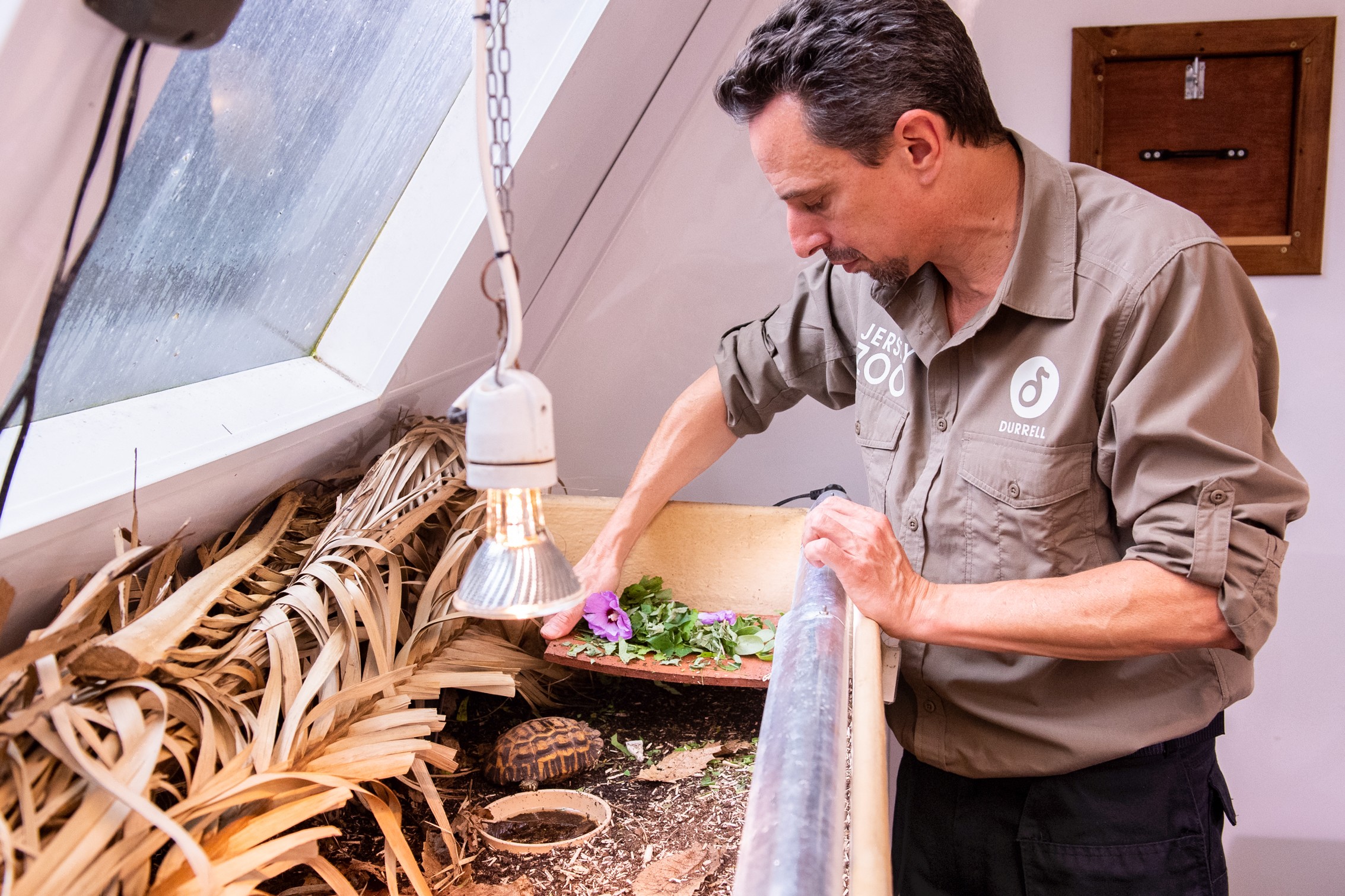
Pictured: Matt explained how they need "a building with better insulation and more natural light."
“Durrell is also proud to be a leader in best practice when it comes to animal welfare and husbandry and, as we learn more and these areas advance, we need the facilities to support this evolution.
“We are also very conscious of sustainability and would like a building with better insulation and more natural light so that we can reduce our costs and energy use.
“And, of course, we would like better facilities to show visitors the work that goes on behind the scenes and to enable them to see more of the animals we are looking after, so they have a better understanding and appreciation of the challenges we, and these species, are facing.”
This article first appeared in the September edition of Connect Magazine – read the digital edition in full below...
Comments
Comments on this story express the views of the commentator only, not Bailiwick Publishing. We are unable to guarantee the accuracy of any of those comments.